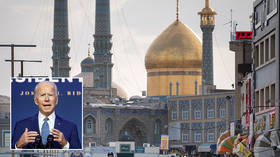Even if Biden lifts sanctions, Iran under no illusion over lengths US will go to to derail its leadership

Donald Trump’s insistence on unwinding the legacy of the Obama era may end up being a nonsensical waste of time, money and ultimately, lives.
A significant component of this anti-Obama barrage famously involved Trump publicly ripping up the Joint Comprehensive Plan of Action (JCPOA), also known as the Iran Nuclear Deal.
The resulting aftermath has seen the US reinstate heavy sanctions, the Iranian economy consistently on the brink of collapse, as well as an International Court of Justice (ICJ) ruling which confirmed that the US’ strong man approach to dealing with Iran was detrimental to Iranian life.
Washington also recently attempted to invoke a clause in the JCPOA to trigger further sanctions on Tehran, even while it had reneged on the agreement entirely two years earlier.
Also on rt.com Is the US abandoning its war on Iran to focus directly on the so-called China threat?While sure to irk the Israeli leadership, reports are now suggesting that Biden, who declared victory in the US presidential election, may be looking to reinstate the Iran deal almost as swiftly as he takes office. According to his former senior aide, in the first few months of a Biden presidency (if the Orange Man in fact leaves office peacefully), we can either expect the US to rejoin the deal fully, or we may see some tit-for-tat scenario whereby Washington lifts sanctions in exchange for the suspension of Iran’s nuclear program.
Never one to shy away from a petty dispute, reports are also suggesting that the Trump administration, in tandem with Tehran's closest rivals in the region, are planning an array of sanctions to hit Iran in a last ditch effort to make re-entering the JCPOA as difficult as possible. Just last month, US Special Representative for Iran Elliot Abrams told the National that Biden could not possibly lift all the US sanctions on Iran even if his administration genuinely wanted to.
Iran, for its part, has already called on Joe Biden to “compensate for past mistakes” and reinstate America’s involvement in the JCPOA. It has also ruled out renegotiating its terms, consistent with its representations towards the Trump administration. For example, in a recent op-ed for CNN, Biden seemed to suggest that his administration will focus on Iran’s ‘regional activities’ and ballistic missile program. In that vein, the Trump and Biden administrations may not be all that far apart in substance, though there is no doubt that their style will be wildly exclusive.
However, it needs to be said that the Iran deal was fit for purpose and did as it was intended to do. Most importantly, even Trump’s own hawkish administration found Iran was routinely compliant with its terms, prior to Trump’s unilateral reneging of the deal. It doesn't mean though that the JCPOA is a glorious document hellbent on saving the world from nuclear annihilation.
Firstly, Trump’s conduct has proven pretty well that the US cannot be trusted to honor an accord, so the agreement is barely worth the paper it was written on. Even when the ICJ rules that the US is acting in contravention of its bilateral agreements (agreements which it has nonetheless sued Iran under), the US turns around and claims the agreements are bogus.
Secondly, the JCPOA was established as a precursor to war. As outlined in a questionable manuscript entitled “Which Path to Persia? Options for a New American Strategy toward Iran”:
“For those who favor regime change or a military attack on Iran (either by the United States or Israel), there is a strong argument to be made for trying this option first. Inciting regime change in Iran would be greatly assisted by convincing the Iranian people that their government is so ideologically blinkered that it refuses to do what is best for the people and instead clings to a policy that could only bring ruin on the country. The ideal scenario in this case would be that the United States and the international community present a package of positive inducements so enticing that the Iranian citizenry would support the deal, only to have the regime reject it. In a similar vein, any military operation against Iran will likely be very unpopular around the world and require the proper international context – both to ensure the logistical support the operation would require and to minimize the blowback from it. The best way to minimize international opprobrium and maximize support (however grudging or covert) is to strike only when there is a widespread conviction that the Iranians were given but then rejected a superb offer – one so good that only a regime determined to acquire nuclear weapons and acquire them for the wrong reasons would turn it down.”
Also on rt.com Sanctions, assassinations, threats by US... Who’s surprised by hardliners winning Iran’s elections?The plan, until Trump’s interference, was to make Iran look like the “bad guy”, thereby garnering international support for an intervention. While the media (including beacons of “adversarial journalism” such as the Intercept), has certainly done its part in maintaining Iran’s image as the “bad guy”, international support for punishing Iran for suffering under American unilateralism is almost non-existent, particularly as far as Washington’s western allies are concerned.
This is precisely why Iran is never going to sit around and wait for a genuine anti-war candidate to save it from a US-backed conflict. While the lifting of sanctions would go a long way to preserving stability, Iran is under no illusion about the lengths to which the US establishment will go to derail the current Iranian leadership. This can be seen most clearly in a recent tweet from Iran’s Foreign Minister Javad Zarif, who once again extended Tehran’s hand to its neighbours to create a dialogue without external interference.
A sincere message to our neighbors:Trump's gone in 70 daysBut we'll remain here foreverBetting on outsiders to provide security is never a good gambleWe extend our hand to our neighbors for dialog to resolve differencesOnly together can we build a better future for all.
— Javad Zarif (@JZarif) November 8, 2020
The other important variable to bear in mind is the fact that Iran’s so-called “moderate” leadership may be just months away from being replaced with a much more conservative sect of the Iranian elite in the 2021 presidential election.
While it is unclear whether Biden will see fit to re-join the JCPOA, what is clear is that Iran is at a clear disadvantage as far as future bargaining power is concerned. Will a Biden administration resist the urge to use Iran’s weakened position to Washington’s advantage, or can Iran expect a little breathing space for the next four years or so?
Only time will tell.
Think your friends would be interested? Share this story!
The statements, views and opinions expressed in this column are solely those of the author and do not necessarily represent those of RT.














